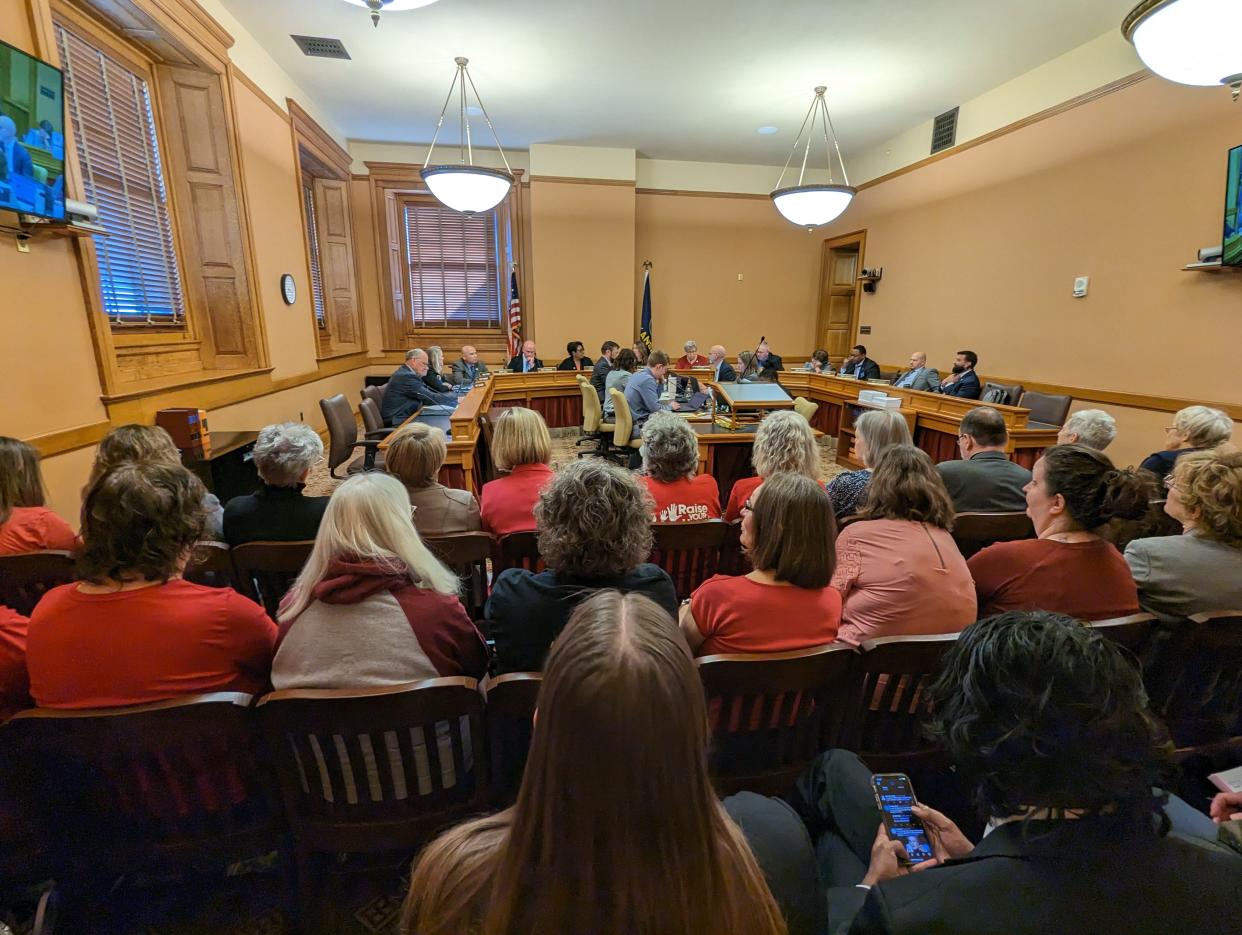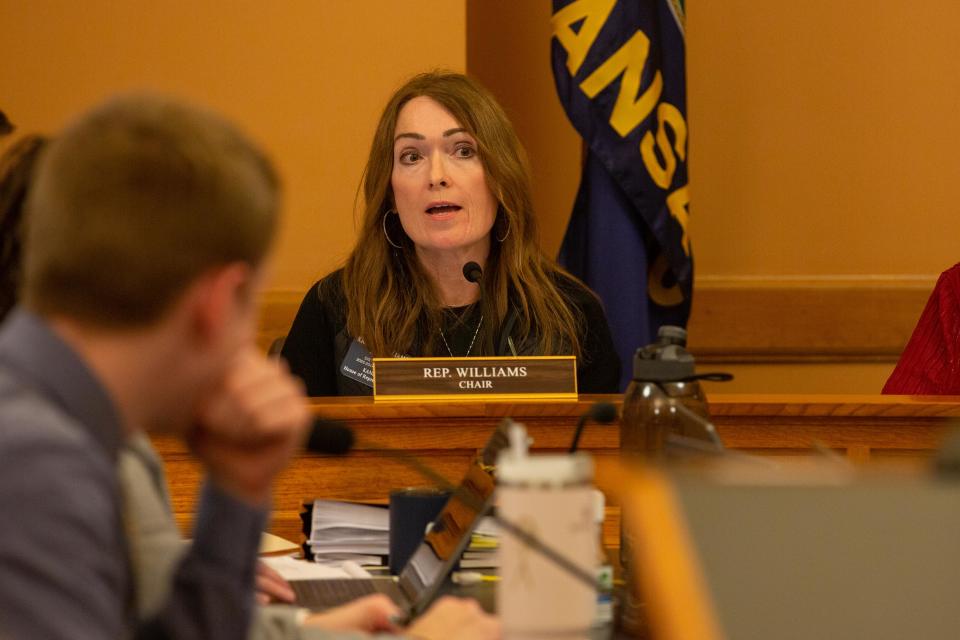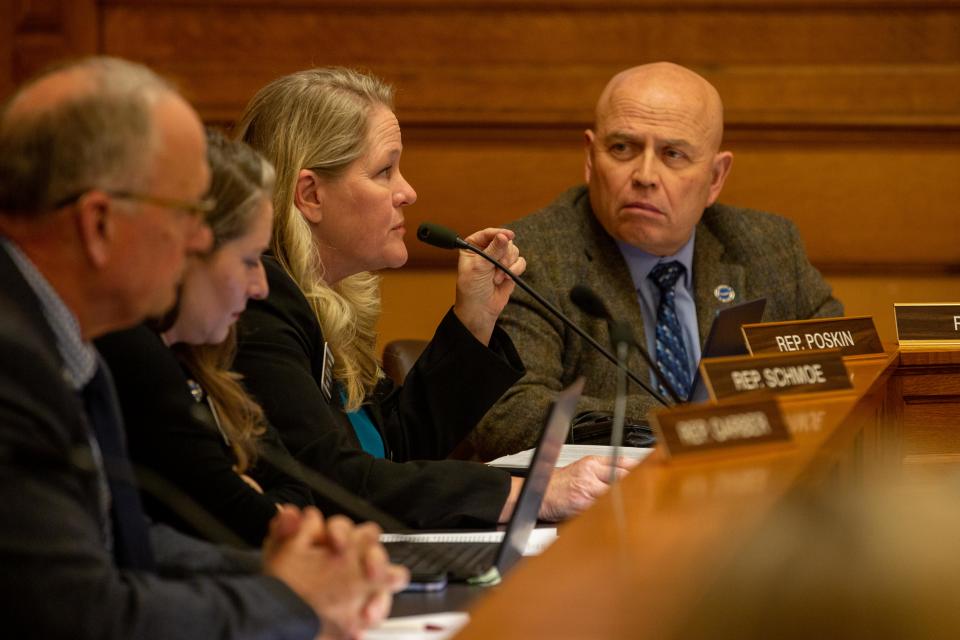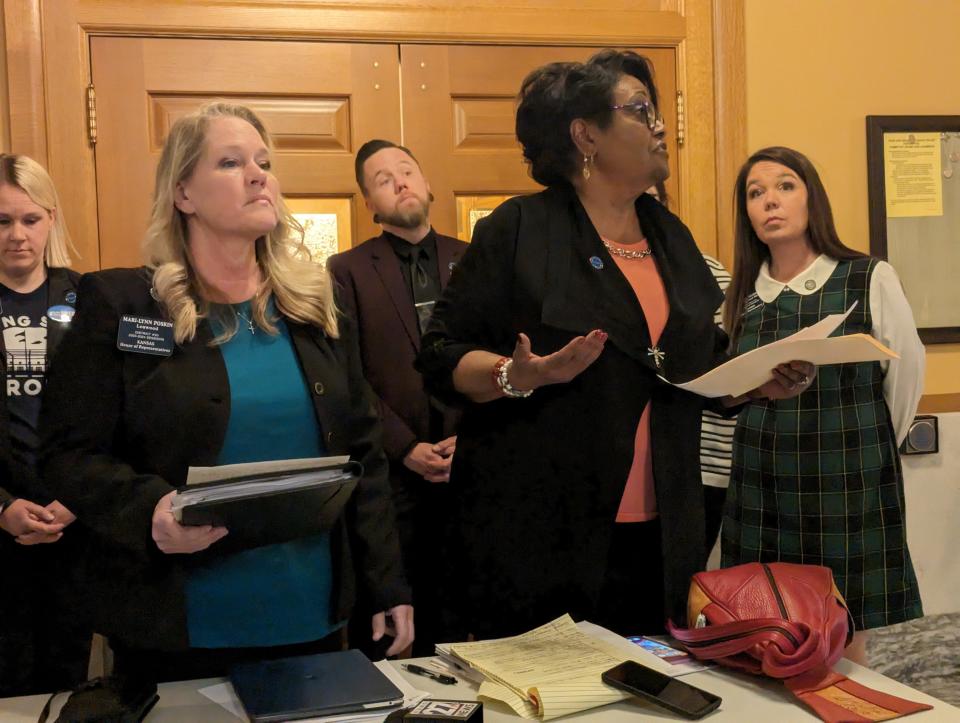Democrats cry foul as Republicans attach raises, special education funding to voucher bill

Kansas House Republicans on Monday advanced a deeply controversial bill that could reshape the state’s public-private K-12 education system but not before attaching a few items that, for years, have been on Democrats’ wish-list for schools.
The House K-12 Education Budget Committee on Monday worked and advanced SB 83. Originally a Senate Education Committee bill on expansion of tax credit scholarships for low-income students, the House committee “gutted” the contents of SB 83 and replaced with them with HB 2218, which would create a voucher-like education savings account program.
More:Should taxpayer money help pay for some Kansas families' private school tuition?
Dubbed the Sunflower Education Equity Act, the law would allow Kansas families to use taxpayer dollars to pay for non-public educational expenses, such as private school or other academic services and materials.
The families would receive 95% of the per-pupil funding their student would have otherwise receive if they had attended public school, with the other 5% reserved for program administration.
Estimates have been extremely rough as to the cost of the program. A figure prepared by the Kansas State Department of Education estimated that the program would cost at least $151.9 million, assuming all accredited private school students and just 1% of Kansas’ 484,000 public school students participate.
Amendments since that estimate and still-undetermined administrative costs have created a murky financial picture for the program, and Republicans on the committee declined to provide cost projections.
Supporters of the education savings account program, chief among them committee chair and Augusta Republican Kristey Williams, say such accounts could help low-income students, particularly those at the state’s lowest academically performing public schools, attend private education options.
More:With tax credit scholarship program, Republicans aims to expand Kansas school choice
Critics of the proposed program meanwhile argue that education savings accounts, which function virtually identically to school vouchers, divert taxpayer funding meant for public schools to unregulated and unmonitored private schools.
Further, Democrats on the committee alleged that two amendments added to the the bill Monday are “lipstick on the proverbial pig,” meant to lure moderate Republicans to vote for an otherwise dubious bill.
Kansas education savings account bill would attach teacher salary increases

The bill, as amended by the House committee on Monday, would also require school districts to raise teacher salaries every year.
At the tail end of a Kansas Supreme Court-approved plan to restore school funding to constitutionally adequate levels, the Legislature is now required to increase school funding at the rate of inflation, as measured by a three-year rolling average of the U.S. Bureau of Labor Statistics’ Consumer Price Index for All Urban Consumers in the Midwest Region.
More:Kansas' average teacher pay is better than peers in Missouri but not other neighbors, report says
Kansas school districts, under the bill, would be required use at least half of any increase in funds to pay for teacher salary raises.
“Part of my rationale is that this is an inflation-based measure, and our teachers are experiencing drastic inflation, so I want to help them out now,” said Rep. Susan Estes, a Wichita Republican who introduced the amendment.
The amendment contains a provision that says nothing in it should be interpreted as prohibiting teachers from negotiating, but it remains legally unclear if the bill could violate other state laws that delegate compensation decisions to negotiations between local school boards and teachers union chapters.
More:How can Kansas put students into teacher pipeline? Start with more money, task force says.
Although Kansas Democrats have typically advocated for increased teacher pay, they balked at what they said was an attempt to mix policy with budget, especially on education savings accounts that they’ve vehemently opposed.
“Our teachers deserve more,” said Rep. Jarrod Ousley, D-Merriam, in opposition to the amendment. “They deserve everything they’ve earned, and that’s probably not what they’re getting — whether it’s respect in the classroom, respect in the committee room or their salary schedule.”
Special education fully funded under ESA bill, but at what cost?

Separately, Republicans on the committee tacked onto the bill a $72 million boost to the Kansas Legislature’s funding for special education.
Democrats and public school advocates for years have decried the Kansas Legislature’s failure to meet a state statute that says the Legislature must pay for at least 92% of the excess costs of special education, which can require expensive, resource-intensive services.
More:Is Kansas Legislature underfunding special education? Advocates say the state is falling far short
The Legislature for the past decade has failed to fund that obligation at that level, paying instead about 70% of those costs. That’s in addition to a federal government failure to pay for its legally required share of excess special education costs.
Because special education services are federally mandated, Kansas public schools argue they have had to divert funding meant for general education students to pay for the pricey special education services.
Gov. Laura Kelly’s budget proposal includes that $72.4 million boost as the first year of a plan to reach 92% of excess special education costs in five years, at which point Kansas would be paying $362 million more than it does now.
House Republicans like Williams in the past have been skeptical of claims that the Legislature has failed to meet special education costs, arguing that other sources of state funding for public schools ultimately add up to more than 92% of the excess special education costs.
More:Laura Kelly's budget boosts special education funding, state worker pay. Here's what to know.
Republicans on the committee this year also voted to create a special education funding task force, which Democrats agreed with in principle but feared would distract from actual attempts to fully fund special education.
“I think this is good policy,” said Rep. Adam Thomas, R-Olathe, who in addition to serving on the House K-12 Education Budget Committee, also chairs the Education Committee. “This is a good compromise with the governor’s recommendation, and I think that as we wait and wait and wait to see what the feds will do with special education, I think this is a great gesture by the Legislature to add that.”
‘Lipstick on proverbial pig’

Among other smaller, technical changes to the bill, the committee also made a amendment that would allow Kansas' smallest school districts the latitude to use the greater of the previous four years' enrollment in calculating total students for funding purposes. That's compared to the current formula for all schools, which only allows the preceding two years.
Rep. Scott Hill, R-Abilene, said he wanted that amendment in order to mitigate any potential swings in enrollment small districts with 1A-sized high schools might experience from losing even just a handful of students. More than 60 of Kansas' 105 counties don't have an accredited private school, although proponents of the bill argue that education savings accounts could induce more organizations and individuals to open schools.
More:Kansas K-12 enrollment up slightly. But it may never return to pre-pandemic levels.
Democrats on the committee were sharply skeptical of Republicans' about-turn on several of the amendments to the bill, as well as what they said was an underhanded, opaque process they used to push through the education savings accounts.
At a news conference following the committee meeting, Kansas House Democrats said Republican leadership was "gaslighting" members of the public on the issue.
"This is the third attempt this session alone to put lipstick on the proverbial pig," said Rep. Mari-Lynn Poskin, a Leawood Democrat. "Voucher bills are no popular amongst our Republican colleagues. These colleagues know that vouchers are overwhelmingly disapproved by their own constituents."
It remains unclear if the bill will find enough Republican support in the full House to pass through to a conference committee, let alone whether Kelly will sign it. If the governor were to veto it, a veto override seems even more unlikely.

"Governor Kelly will evaluate the bill if it reaches her desk," said Brianna Johnson, spokesperson for Kelly. "Her priority is ensuring public schools maintain full funding and have the resources they need to serve every student, including our special education students."
Meanwhile, Democrats said they will continue to push for support for a standalone, special education funding bill.
"When a first-grader is escaping their classroom because of a lack of supervision because of the schools are strapped for cash, we've got issues, folks," said Ousley, the Merriam representative. "Again, I fear that it may take another lawsuit to settle if the Legislature doesn't want to do the right thing and not play games like this."
Rafael Garcia is an education reporter for the Topeka Capital-Journal. He can be reached at rgarcia@cjonline.com or by phone at 785-289-5325. Follow him on Twitter at @byRafaelGarcia.
This article originally appeared on Topeka Capital-Journal: Kansas school voucher bill tied to teacher pay increases, SPED funding

